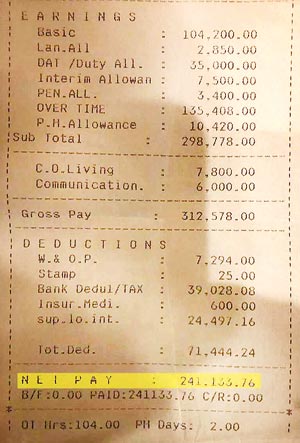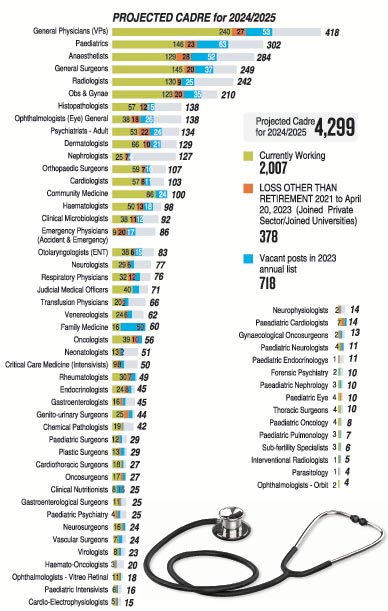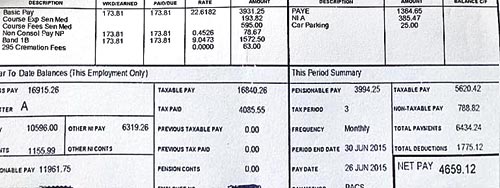News
Experts call for urgent steps to save sinking state health sector ship
The state health sector is gasping for breath and sinking due to young medical specialists leaving Sri Lanka in droves, while the authorities are turning both a blind eye and a deaf ear.
“No action is being taken to stop the brain drain,” reiterated many health experts and specialists, while pointing out that even junior doctors (senior house officers/medical officers) are jumping the ‘state health sector ship’ whenever they get the chance.
One specialist pointed out that many who complete their internship of one year, after they walk out of medical school armed with their MBBS degrees, sit for such examinations as the United Kingdom’s Professional and Linguistic Assessments Board (PLAB) test which would enable them to seek employment in the UK. They do not seek a job as a post-intern.
Why, asked the Sunday Times, from numerous experts and specialists to which we got some common answers and other varying suggestions.
“The main trigger is the terrible economic situation in the country. For numerous specialists, their salaries are just not enough to cover their basic cost of living,” one specialist said, explaining that for some specialists there is also no private practice (PP) to augment their income.
According to this source only 20% of all doctors are engaged in PP.
He said that when they return from abroad after specialization, they are sent to a distant outstation hospital. The salary is poor compared to countries such as the UK and Australia and they are also burdened with other situations – their children’s education. If they keep their families in a prominent town due to the educational needs of their children, then the family is broken apart, they have to run two homes because the quarters provided in the outstation are not too good and they have to travel back and forth facing huge fuel bills. This is beyond their salaries because most of them do not have any family wealth as their parents have spent every cent to educate them.
Another specialist, taking the case of a woman doctor said that she would have to leave her children behind for grandparents or relatives to look after.
Referring to rupees and cents, a source pointed out that a specialist earns around Rs. 240,000 with overtime (OT) or around Rs. 160,000 without OT. He/she has to now face 30-40% tax cuts, so what is the take-home salary and is it adequate even for a basic life? In comparison, the Sunday Times learns that currently a senior banker’s tax payment is around Rs. 300,000 – this tax payment alone is much more than the take-home salary of a specialist.
It is not only the specialists who are underpaid, it is understood. An intern, who works 24/7 including nights without a break gets around Rs. 57,000 as a salary, when a medical sales representative has a much better life and earns much more.
“Back in the UK in 2015, a registrar (not even a specialist) could take home a salary of over £ 4,600 (over Rs. 952,000 at the then rate of around Rs. 207 to the Sterling Pound). This was not even for a specialist who would have been earning around Rs. 1,929,645 (Rs. 1.9 million) after deductions. After eight years, a specialist in Sri Lanka earns around Rs. 240,000. Is it surprising that doctors both juniors and specialists are abandoning this country,” asked this source.
Ironically, the Sunday Times understands that the UK is lobbying actively to employ Sri Lankan doctors by sending emails about vacancies over there to professional colleges here.
Another crucial factor is that on their return some specialists are posted to outstation hospitals which have no facilities for them to use their skills. If there is no endoscope at this hospital, what happens to extensive training and skill, many queried. There were also complaints that a doctor-couple would be posted to two far away hospitals, disrupting their family life.
Many charged that the “dushkara sevaya” (duty at difficult stations) never ended, with one stating how he has served in Trincomalee, Vavuniya, Ampara and from 2008 in a hill station, with his family living in Colombo. This is due to various factors, he said, critical of the transfer list not being finalised with different parties going to court. They were now relieved that the legal matters have been sorted out and the transfer list can be activated.
Other examples were Cardiothoracic Surgeons being posted to Kurunegala where there were no surgical facilities. Poor planning on the part of the Health Ministry is obvious, a source said, explaining that facilities for heart surgery are available at the National Hospital of Sri Lanka (NHSL), the Kandy National Hospital, the Jaffna Teaching Hospital and the Karapitiya Teaching Hospital. The need would have been to set up heart surgery facilities in the east or have a good referral system as Kurunegala patients can always access Kandy.
More recently, he cited an example of a Cardiologist being asked to function 24 hours at a Catheterisation Laboratory and questioned whether it was humanly possible to do that.
A few blamed the extended retirement age, alleging that this was not allowing young specialists to come to more attractive end stations such as Colombo and Kandy. As such, they were stuck in the outstations sans facilities and could not plan their future, they claimed, adding that then they would be tempted to leave for greener pastures. Why, they queried, were not over-60 specialists asked to work in the outstations.
A different viewpoint was that young doctors in a reflection of the younger generation had very high expectations.
| A few hard-hit specialties | |
|
| Exodus peak should plateau soon | |
| The loss of young medical specialists is multi-factorial, said Prof. Dileep De Silva who has been dabbling with health data.Before dealing with the brain drain, he said that according to data from the University Grants Commission (UGC), the recurrent cost borne by Sri Lanka to produce a doctor (five years) in 2020 was Rs. 4.18 million and dental surgeon (five years) was Rs. 8.62m. This was as opposed to Rs. 2.24m for an engineer; Rs. 2.12m for someone into allied science (four years); Rs. 1.37m for someone into science; Rs. 1.03m for a lawyer; and 1.07m for someone into business studies; He explained that there has always been a loss of about 12% from among those who went abroad for their post-graduate training in medicine. This was while from around 1,400 post-interns, about 100-150 did not request jobs in the state health sector. They were mostly medical graduates who had got their MBBS from abroad, who after their internship went abroad or sought jobs in the private “Now there is increased migration of young specialists because of the five-year leave granted by the government and the economic situation in the country. Many specialists who had sent their children for medical education abroad were badly hit by the dollar crunch brought on by the economic crisis,” he said, explaining that other issues include comparatively lower salaries, being at stations where they cannot engage in private practice (PP) and families being in another place due to better facilities. The lengthening of the retirement age has also put paid to young specialists’ career plans to come to popular end stations such as Colombo and Kandy where they would have a more comfortable life and PP. However, Prof. De Silva assured that like the COVID-19 pandemic there would be a peak and then a plateauing, which is now being seen gradually. Some who left Sri Lanka’s shores are also coming back due to not getting popular schools abroad for their children etc. Prof. De Silva, along with eminent academics from the Kelaniya University, is currently engaged in a research on ‘who is really leaving’ the country from the health sector.
|
| How to stymie the brain-drain in the state health sector | |
| “Give all the doctors including specialists their market value and provide facilities or extra payments for accommodation and travel to the latter group if they are posted to outstation hospitals,” was one suggestion, with many pointing out that doctors both senior and junior were coming to work by bus because they could not run their cars.Others said that the transfer list should be implemented early while the National Health Policy introduced in 2016 should be put into action, while taking a strong in-depth look at the feasibility of the five-year leave plan of the government. “The National Health Policy is on paper but nothing is being implemented. There is no monitoring and evaluation to ensure that milestones needed to reach a set destination are achieved,” one added. |

The pay-slip of a specialist


The pay-slip of a registrar in the UK in 2015
The best way to say that you found the home of your dreams is by finding it on Hitad.lk. We have listings for apartments for sale or rent in Sri Lanka, no matter what locale you're looking for! Whether you live in Colombo, Galle, Kandy, Matara, Jaffna and more - we've got them all!

